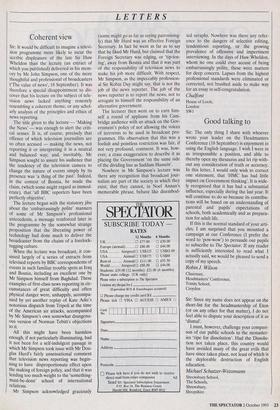LETTERS Coherent view
Sir: It would be difficult to imagine a televi- sion programme more likely to incur the acerbic displeasure of the late Sir Huw Wheldon than the lecture (an extract of which you published) delivered in his mem- ory by Mr John Simpson, one of the more thoughtful and professional of broadcasters (The value of news', 18 September). It was therefore a special disappointment to dis- cover that his lecture on the subject of tele- vision news lacked anything remotely resembling a coherent theme, or any schol- arly analysis of the principles and ethics of news reporting.
The title given to the lecture — 'Making the News' — was enough to alert the criti- cal senses. It is, of course, precisely that offence of which television journalists are so often accused — making the news, not reporting it or interpreting it in a neutral and balanced way; and, inevitably, Mr Simpson sought to assure his audience that the tendency of the television camera to change the nature of events simply by its presence was 'a thing of the past'. Indeed, in the context of Bosnia, he made the claim, (which some might regard as immod- erate), that 'all BBC reporters have been perfectly objective'.
The lecture began with the statutory jibe about the 'embarrassingly polite' manners of some of Mr Simpson's professional antecedents, a message reinforced later in the programme by the somewhat strange proposition that the liberating power of technology had done much to deliver the broadcaster from the chains of a forelock- tugging culture.
When the lecture was broadcast, it con- sisted largely of a series of extracts from televised reports by BBC correspondents of events in such familiar trouble spots as Iraq and Bosnia, including an excellent one by Mr Simpson himself from Baghdad. These examples of first-class news reporting in cir- cumstances of great difficulty and often physical danger were, unhappily, accompa- nied by yet another replay of Kate Adie's notorious dispatch from Tripoli at the time of the American air attacks, accompanied by Mr Simpson's own somewhat disingenu- ous version of Norman Tebitt's objections to it.
All this might have been harmless enough, if not particularly illuminating, had it not been for a self-indulgent passage in which Mr Simpson took issue with Mr Dou- glas Hurd's fairly unsensational comment that television news reporting was begin- ning to have disproportionate effect upon the making of foreign policy, and that it was lending too much weight to the 'something- must-be-done' school of international relations.
Mr Simpson acknowledged graciously (some might go as far as saying patronising- ly) that Mr Hurd was an effective Foreign Secretary. In fact he went as far as to say that he liked Mr Hurd, but claimed that the Foreign Secretary was edging, or 'tip-toe- ing', away from Bosnia and that it was part of the responsibility of television news to make his job more difficult. With respect, Mr Simpson, as the impeccably profession- al Sir Robin Day might say, that is not the job of the news reporter. The job of the news reporter is to report the news, not to arrogate to himself the responsibility of an alternative government.
The lecturer then went on to earn him- self a round of applause from his Cam- bridge audience with an attack on the Gov- ernment's policy of not allowing the voices of terrorists to be used in broadcast pro- grammes. His observation that this was a foolish and pointless restriction was fair, if not very profound, comment. It was, how- ever, a crass exaggeration to describe it as placing the Government 'on the same side of the dividing line as Saddam Hussein'.
Nowhere in Mr Simpson's lecture was there any recognition that broadcast jour- nalists are part of the society in which they exist; that they cannot, in Noel Annan's memorable phrase, behave like disembod-
ied seraphs. Nowhere was there any refer- ence to the dangers of selective editing, tendentious reporting, or the growing prevalence of offensive and impertinent interviewing. In the days of Huw Wheldon, whom no one could ever accuse of being embarrassingly polite, these were matters for deep concern. Lapses from the highest professional standards were eliminated or corrected, not brushed aside to make way for an essay in self-congratulation.
Chalfont
House of Lords, London SW!


















































 Previous page
Previous page